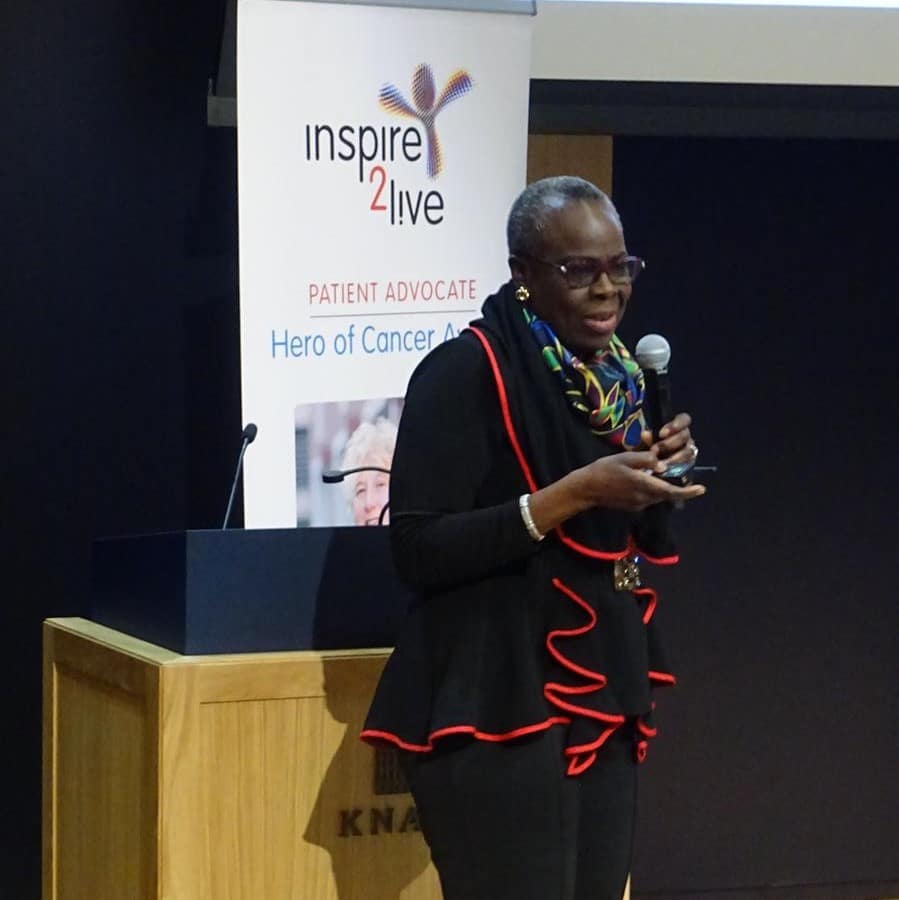On our Inspire2Live Annual Congress, Olufunmilayo Olopade (she also responds to Funmi) picks up the tenet of the keynote lecture ‘We need to focus on prevention’ by Bob Weinberg
She grew up in Nigeria, where resources are low, and she learned medicine based on the message: ‘prevention is better cure’. That’s the area of her research, in particular Personalized Risk Assessment and Prevention. We have been made humble by the fact that your DNA isn’t your destiny. But we have also learned that to a certain extent cancer comes from heredity, and the rest comes from other risk factors, which you may be able to modify. We do not know all the risk factors yet, but we do know, for example that if you are not sick, but have a BRCA1 or 2, or some other predisposing mutation in your family, that can be a trigger for you to start thinking about specific screening, and possibly about treatments informed by your genetic mutation.
We know that indiscriminate population screening for breast cancer also ‘discovers’ and treats a number of indolent tumors that would never have developed to invasive cancer. The total gain in survival is negligible, and the cost in stress, overtreatment and money is large. Why not focus on the women with the most risk and try to save them? An important discovery was that different ethnic origins can have very different susceptibilities to certain mutations, and to certain forms of breast cancer. A lot of research has been done for instance into mutations in Ashkenazi Jews, but they found very different patterns with a sample of Nigerian women younger than 45, where the incidence of BRCA and other mutations turned out to be much higher than in a control group. This discovery raises the question of how to apply risk stratification in order to screen most effectively. The usual age limit of 50 will cause you to miss all those patients who have this inherited mutations in breast cancer genes.
Knowledge about these mutations will make it possible to look at different risk-groups within the population with optimized screening and testing methods. She gives the example of Beyoncé’s father, who was the first prominent African American man to disclose he had the BRCA2 mutation, and he had male breast cancer. She is a fan of Beyoncé, so she hopes that Beyoncé will help raise awareness of breast cancer throughout the world.
If you are unaffected but have a BRCA mutation, then interventions are available, and nobody should have to die because of BRCA anymore. A large trial among women over 40, called Women Informed to Screen baseD on Measures of risk (WISDOM) is underway in America, looking at the difference between regular screening and risk-based screening. They hope to develop tools to measure individual cancer risk for a woman, the challenge here is to find productive ways to translate this into something that actually helps the woman: If the population risk of getting cancer is 13.3%, but your personal risk is 31,3%, then what are the things you could or should do?
In other studies, they have developed tools to manage women after genetic testing using tools like CancerIQ Manager and are monitoring women with BRCA1 mutation with six-monthly MRI screening. Thanks to very good imaging tools they find tumors when they are on average 6.1 millimeter, resulting in much better treatment success. So the answer to ‘How do you reduce the occurrence of these aggressive cancers’ is known. Implementation requires better and faster MRI’s, better imaging protocols. And abolishing mammography because of its ineffectiveness and radiation load. Cancer Interception is becoming a reality. Population Risk Stratification is on its way to the mainstream.
Several open questions remain (when and how to test, when to intervene, how to integrate clinicians and genetic counsellors to provide true cancer genetic risk assessment service). More trials are needed to speed this up.
This talk contains many more stories and wisdom than can fit on this page, so watch the talk and her presentation sheets on our website.. You will find it a rewarding experience, a genuine look into the future.
You can follow her on Twitter at @folopade
Tielo Jongmans
Patient Advocate Inspire2Live

